Many of the best protein powders we’ve tested are low in carbs, calories, and added sugars. A low-carb protein powder can be useful for those looking for a concentrated dose of protein that can support their fitness goals without disrupting their diet. Of course, the sheer volume of protein powders on the market can be overwhelming. Who has time to look at package labels and compare testing notes on hundreds of products? Well, we do! Aren’t you lucky?
Our shake-savvy testers sifted through hundreds of protein powders to identify high-quality brands that deliver what they promise, from clean formulations to impressive macro balances. Our list has a little something for everybody, with a selection of whey protein powders sitting alongside vegan, casein, and egg white options. What they all have in common, though, is a low carb count. Keep reading as we unpack the best low-carb protein powders that can help support your health goals.
The 10 Best Low-Carb Protein Powders of 2024
- Best Low-Carb Protein Powder Overall: Transparent Labs Whey Protein Isolate
- Best-Tasting Low-Carb Protein Powder: XWERKS Grow
- Best Low-Carb Whey Isolate Protein Powder: Jacked Factory Authentic ISO
- Best Low-Carb Protein Powder for Athletes: Onnit Grass-Fed Whey Protein
- Best Low-Carb Pea Protein Powder: Ritual Essential Daily Shake 18+
- Best Grass-Fed Low-Carb Protein Powder: Legion Whey+
- Best Vegan Low-Carb Protein Powder: Momentous Essential Plant-Based Protein
- Best Budget Low-Carb Protein Powder: Bulk Supplements Whey Protein Isolate 90% Powder
- Best Low-Carb Egg White Protein Powder: Naked Nutrition Naked Egg
- Best Low-Carb Casein Protein Powder: NOW Sports Micellar Casein
Editor’s note: The content on BarBend is meant to be informative in nature, but it should not be taken as medical advice. The opinions and articles on this site are not intended for use as diagnosis, prevention, and/or treatment of health problems. It’s always a good idea to talk to your doctor before beginning a new fitness, nutritional, and/or supplement routine. Individual needs for vitamins and minerals will vary.
How We Tested and Chose the Best Low-Carb Protein Powders
The BarBend team is made up of competitive athletes, certified personal trainers, and lifelong fitness enthusiasts. To determine the best low-carb protein powders available today, we’ve tested nearly 100 different profiles from the industry’s best brands, using our BarBend supplement testing methodology to rate each profile on a scale of 1 (lowest) to 5 (highest). Below are some of the categories and components that played into our rankings.
Protein Content
You can’t review protein powders without looking into the protein content of the products in question. And we’re not just talking about the amount of protein per serving in a product. It’s also important to look at what type of protein the product contains.
First, how much protein does the average person need? Research shows that the average consumer needs anywhere from 0.8 to 1.3 grams of protein per kilogram of body weight. (1) This increases to 1.2 to 1.7 grams per kilogram of body weight for strength and endurance athletes. (2)
When it comes to the type of protein a powder is made from, research shows that milk proteins from whey and casein can help build muscle mass and strength. (3) On the other hand, egg white protein shows promise to provide a potent protein source full of amino acids and can support upper body physical function. (4) Finally, there is pea protein, which has solid protein content, is easy for the body to absorb, and can help support gut health. (5)(6)
Calorie Content
Although your health goal may not be weight loss, it’s still vital to ensure that the protein powder you choose is not drowning in empty calories. That is why you should always look at the calorie content of the protein powder you choose to make sure you get the most nutrition out of each calorie. Limiting carbohydrate content is one way to reduce the calorie content per serving of protein powders.
For protein powders, most brands contain around 100 to 200 calories per serving. For this list, we prioritized powders on the lower end of that range. Our picks have between 90 and 150 calories per serving. If you need more energy for a high-intensity workout, you can always consume more than one serving or mix the powder with calorie-dense foods, like yogurt, milk, or peanut butter.
Flavor
If the protein powder you choose does not taste good, then you’re not going to consume it on a regular basis. In turn, you will not reap the full health benefits and fitness support from the protein powder. Therefore, you must choose a protein powder that fits your taste preferences. You should choose a flavor that you will continue to enjoy over the long term.
Our experts looked not just at flavor, but also the aftertaste and texture of the protein shakes when mixed with water and milk. For some, the ideal protein powder may be an unflavored brand, as unflavored protein powders can be blended with smoothies, soups, protein shakes with fruit and veggies, and cereal. Others may enjoy a protein powder that tastes like a treat so that drinking it doesn’t feel like a chore.
Price
If you’re going to be drinking a protein powder shake on a regular basis, then you’re going to have to make sure it fits your budget. To ensure an option for all athletes, we sought to include budget options below $1 per serving alongside some of the pricier powders we like.
If a protein powder product costs more than $1 per serving, you’ll have to consider if any added ingredients make it worth the extra cost. A higher cost isn’t always an indicator of quality. That is why you should not only look at the cost of a protein powder, but also what, exactly, is driving up the price and if that benefits your training.
Third-Party Testing
Like all dietary supplements, protein powder isn’t regulated by the Food and Drug Administration. Therefore, you may not be sure what is really in the protein powders you buy.
Having third-party testing from an outside lab allows a brand to show consumers that they are not afraid to reveal what is in their products. This kind of testing — and certain certifications like NSF (National Sanitation Foundation) — can help ensure the purity and potency of supplements. Therefore, it’s ideal to choose protein powder products that have some sort of third-party testing for quality.
Best Low-Carb Protein Powder Overall: Transparent Labs Whey Protein Isolate
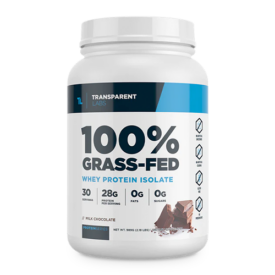
With 8 different flavors and 28 grams of whey protein from hormone-free, grass-fed cows, Transparent Labs Whey Protein Isolate is an excellent way to hit your protein macros.
Specs
- Price Per Serving: $1.99
- Protein Source: 100% whey protein isolate
- Protein Per Serving: 28g
- Calories Per Serving: 120-150
- Third-Party Tested: Yes
- Available Flavors: Milk Chocolate, French Vanilla, Chocolate Peanut Butter, Mint Chocolate Chip, Vanilla Peanut Butter, Strawberry Milkshake, Unflavored, Dark Chocolate, Oatmeal Chocolate Chip Cookie, Cinnamon French Toast, Sugar Cookie, Mocha, Peanut Butter, Vanilla Oatmeal Cookie, Blueberry Pancakes
Pros
- 28 grams of grass-fed whey with between 0 to 3 net carbs per serving
- Gluten-free and non-GMO
- Contains stevia instead of artificial sweeteners, colors, or fillers
Cons
- More expensive at nearly $2 per serving
- Not safe for those with milk allergies or lactose intolerance
- Higher sodium content of 370 milligrams per serving
Transparent Labs Whey Protein Isolate is a third-party tested protein powder with between 0 and 3 net carbs and just 120 to 150 calories per scoop, depending on the flavor. Set those numbers against this product’s 28 grams of grass-fed protein per serving and you’ve got a macro balance we can get behind. We also love that Transparent Labs offers 15 different flavors, from straightforward Unflavored and Vanilla options to more decadent tastes like Dark Chocolate and Blueberry Pancakes.
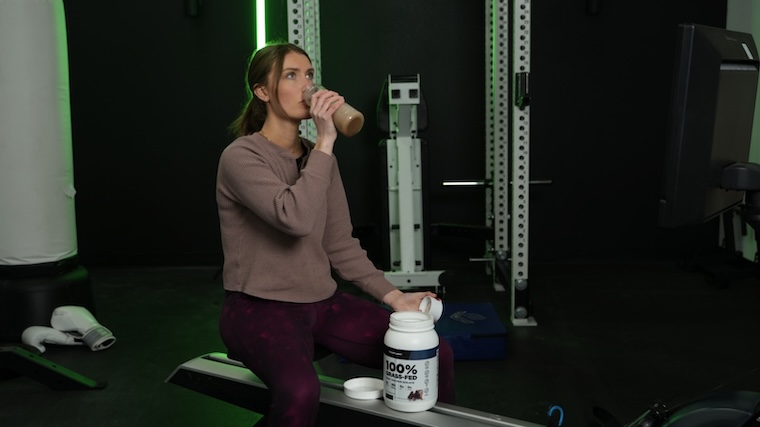
Our tester scored its taste a 5 out of 5 and noted that it doesn’t cause bloating like some other protein powders. They also raved about the Peppermint Hot Chocolate variety, saying, “Throw in some marshmallows and a little whipped cream and it feels like Christmas. Not quite as ‘pepperminty’ as I wanted, but it’s still there for sure.”
[Related: Best Macros Calculator]
They do, however, suggest mixing with a blender as opposed to a shaker bottle. Reviewers online agree and say that this product does have a tendency to clump.
Expert reviewer Chelsea Rae Bourgeois, MS, RDN, LD, does say, “Those who are watching their sodium intake may be deterred by the amount of sodium per scoop.” Each serving of this product contains around 370 milligrams of sodium, which can add up if you consume more than one serving daily. Therefore, if you are following a low-sodium or heart-healthy diet, this may not be the right low-carb protein powder for you.
Based on our own testing, we scored this product at a B overall for purity. The sample we took scored in the top 25 percent among all sampled powders for heavy metals, and the top 10 percent for the presence of bisphenols, phthalates, and pesticides.

We think this protein powder is one to place at the top of your list, though. With certificates of analysis available online to verify third-party testing, our testers gave it 5 out of 5 for its formulation, but a 3.5 out of 5 for price.
Best-Tasting Low-Carb Protein Powder: XWERKS Grow
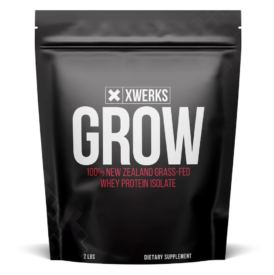
This formula is 100 percent New Zealand Grass-Fed Whey Protein Isolate with 25 grams of protein per serving. It includes no hormones, antibiotics or pesticides and comes in four delicious flavors --- Vanilla, Chocolate, Strawberry, and Peanut Butter.
Specs
- Price Per Serving: $1.96
- Protein Source: 100% whey protein isolate
- Protein Per Serving: 25g
- Calories Per Serving: 110
- Third-Party Testing: N/A
- Available Flavors: Chocolate, Vanilla, Peanut Butter, Strawberry
Pros
- Our testers loved the smooth flavor of the Chocolate variety
- Whey isolate protein processed to dramatically reduce lactose, carbs, and fat
- Contains 6 grams of BCAAs per serving
Cons
- Not third-party tested
- Nearly $2 per serving
We love the smooth and tasty chocolate flavor of XWERKS Grow, one of the best-tasting protein powders we’ve tried. Our tester scored it a 5 out of 5 in terms of taste. “I tried the chocolate flavor and it was kind of like drinking a protein Yoo-hoo,” they said. “I’m surprised at how smooth it is.” Its whey isolate protein comes via a microfiltration process that works to deliver 25 grams of protein while dramatically reducing any accompanying lactose, fat, and carbs.
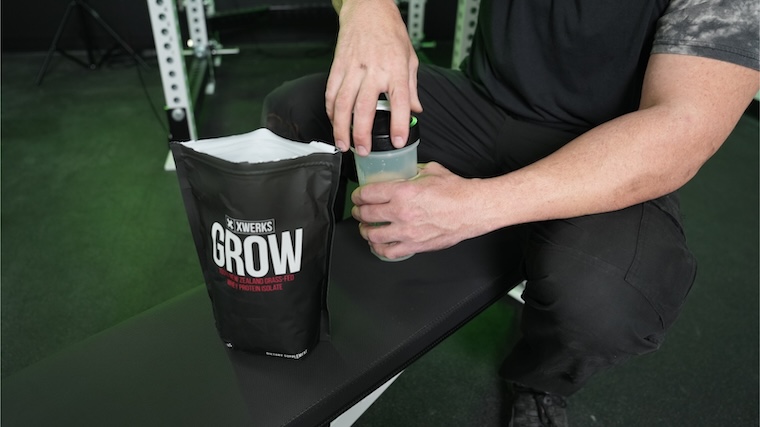
Every keto-friendly scoop contains just 110 calories, between 0 and 2 grams of fat, and 1 to 2 grams of carbs. “You also get 6 grams of BCAAs, making it ideal for building muscle,” notes BarBend expert reviewer Chelsea Rae Bourgeois, M.S., R.D.N., L.D. Furthermore, this product is sweetened with natural flavors like stevia.
Solubility scored a 5 out of 5 with our tester. “Mixing isn’t really an issue at all — I barely needed a blender ball.”
We do, however, wish XWERKS tested this product with a third-party lab, resulting in a 2.5 out of 5 score in the category. At nearly $2 per serving, it’s also one of the pricier protein powders on the market.
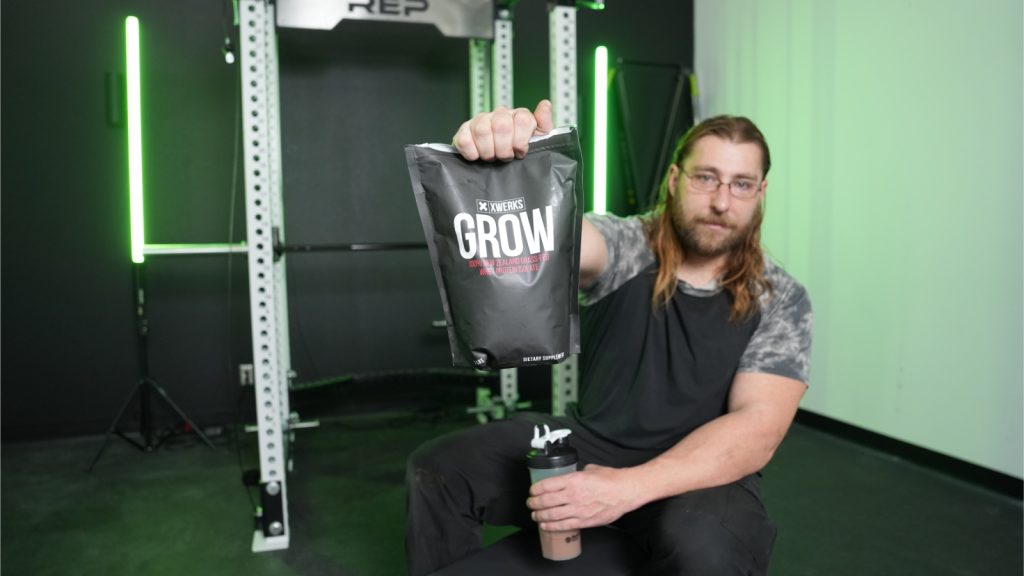
Bourgeois, however, thinks it’s worth the price, scoring it a 4.5 out of 5 for its protein content and formula. “At around $2 per serving, XWERKS Grow is one of the more expensive options on the market. Still, you get 25 grams of protein for $2, so it’s not too outrageous,” she says.
Read our full XWERKS Grow Review.
Best Low-Carb Whey Isolate Protein Powder: Jacked Factory Authentic ISO
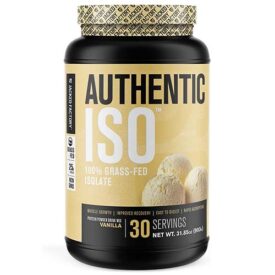
Dig into this easily digesting grass-fed whey isolate that provides 25 grams of protein with each lean 110 calorie scoop. It comes in three tasty flavors at a cost-effective price making it a solid choice for nearly anyone.
Specs
- Price Per Serving: Starting at $1.16
- Protein Source: Grass-fed whey protein isolate
- Protein Per Serving: 25g
- Calories Per Serving: 110-120
- Third-Party Testing: Yes
- Available Flavors: Chocolate, Cookies & Cream, Peanut Butter, Unflavored, Vanilla, Vanilla Oatmeal Cookie, Oatmeal Chocolate Chip, Cinnamon French Toast
Pros
- Contains 25 grams of pure grass-fed whey protein isolate per serving
- Free of fillers and dyes
- Mixes well and has a wide variety of decadent flavors
Cons
- Contains artificial sweeteners like sucralose
- Has some artificial flavors
- Those with a lactose intolerance will want to avoid
Whey isolate protein is created via a microfiltration process that works to retain the dairy’s protein profile while minimizing its carb and fat content. Jacked Factory Authentic ISO is one of the best whey isolates we’ve tried, as its 25 grams of whey protein per serving come via grass-fed cows free from synthetic chemicals and hormones. It’s a clean product that, per research, can improve muscle protein synthesis better than carbs and placebos. (7)
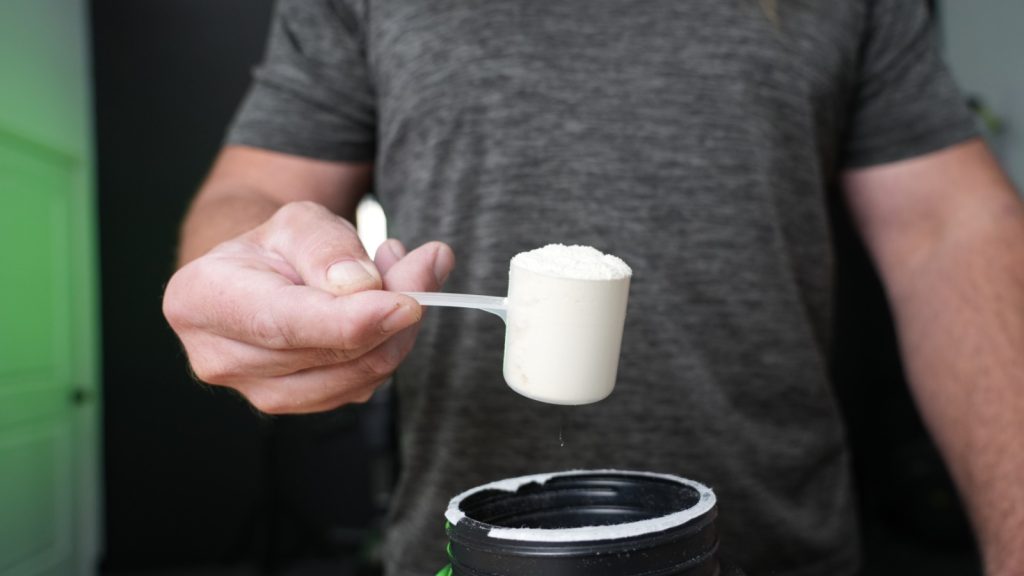
“Each scoop is packed with an impressive 25 grams of protein with minimal carbohydrate and fat content,” notes BarBend expert reviewer Chelsea Rae Bourgeois, M.S., R.D.N., L.D.. “And if you’re prone to getting bored with your protein powder flavors, you’ll likely be excited about Jacked Factory’s dessert-inspired options.”
Those flavors currently include Cinnamon French Toast, Cookies & Cream, and Vanilla Oatmeal Cookie, though the lineup is prone to change. We previously tried their Fruity Cereal Splash flavor and scored it a 4 out of 5. “I noticed a slightly medicinal aftertaste, but nothing that turned me off from the product,” said our tester. “It definitely tasted like Froot Loops.”
Solubility, meanwhile, scored a 5 out of 5. “This whey mixes really easily and it tastes smooth,” our tester said. “But there was a tiny bit of separation that I noticed.” They recommend mixing it in a shaker cup for best results.
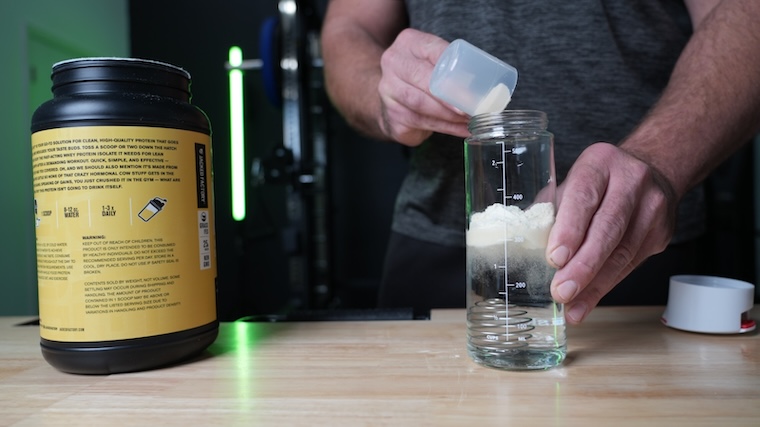
It’s worth noting that while this product is free from fillers and artificial dyes it does contain sucralose, an artificial sweetener that some may find too sweet for their liking. We also wish it had third-party testing results to help verify the amount and efficacy of its ingredients. It was, however, manufactured in a cGMP-Certified Facility.
Bourgeois also points out that some flavors contain up to 300 milligrams of sodium, a significant portion of your recommended daily intake. “If you’re watching your sodium intake for any reason, you might not be keen on this protein powder,” she says. Still, she gave it an overall score of 4.25 out of 5.
Best Low-Carb Protein Powder for Athletes: Onnit Grass-Fed Whey Protein
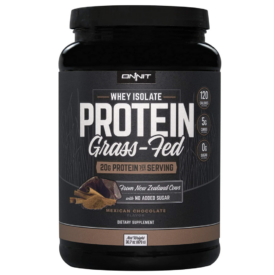
A grass-fed whey isolate includes added ingredients for digestion like seven digestive enzymes and a probiotic (lactobacillus acidophilus). It's also gluten-free, sugar-free, and soy-free.
Specs
- Price Per Serving: $2
- Protein Source: Whey isolate protein
- Protein Per Serving: 20g
- Calories Per Serving: 110-120
- Third-Party Testing: Yes
- Available Flavors: Vanilla, Mexican Chocolate
Pros
- It’s been third-party tested for banned substances by Informed Sport
- Non-GMO and made from milk derived from grass-fed Irish dairy cows
- Contains a digestive enzyme blend
Cons
- Nearly $2 per serving
- Very thin when mixed with water
- Just two flavors available
We think athletes will like Onnit Grass-Fed Whey Protein for a few different reasons. For one, it delivers a solid macro balance that supports lean muscle growth — 20 grams of protein, between 110 and 120 calories, between 3 and 4 grams of carbs, and less than 3 grams of fat per serving, depending on the flavor. It can also provide peace of mind, as it’s been third-party tested by Informed Sport to ensure the purity of its ingredients and that it contains no banned substances.

“Onnit Whey Protein provides an impressive complete amino acid profile to support muscle gains and workout recovery,” says BarBend expert reviewer Chelsea Rae Bourgeois, M.S., R.D.N., L.D. Bourgeois also likes that it contains an enzyme blend “to help promote good digestion.” Research into this probiotic strain — Lactobacillus acidophilus — backs this up. (8)
[Related: Best Probiotic Supplements]

She scores its formulation a 4.5 out of 5. “The macro ratio is on point for its goals, and the enzyme blend is intriguing,” she concludes.
It is, however, light on flavor variety, with just Vanilla and Mexican Chocolate flavors available. Thankfully, we like the taste of the Mexican Chocolate, scoring it a 3.75 out of 5. “I tried the Mexican Chocolate flavor, which was good, but I struggled with how thin it was after mixing it in water,” they said. “It has a bit more body when mixed with whole or oat milk.” Solubility scored a 5 out of 5.

That said, it is a pricier powder at around $2 per serving, especially since it contains between 5 and 8 grams less protein per scoop than some comparably-priced protein powders from Transparent Labs and XWERKS Grow.
Where this Onnit profile stands out, though, is in its third-party testing and digestive enzyme blend, so if those two aspects are compelling, the price may justify itself. You can also save up to 25 percent off if you buy in bulk, so that’s also something to consider.
Read our full Onnit Grass-Fed Whey Protein Review.
Best Low-Carb Pea Protein Powder: Ritual Essential Daily Shake 18+
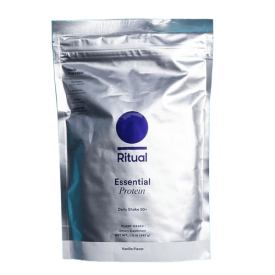
This clean, transparent protein powder relies on organic, non-GMO yellow peas for its 20-gram protein dosage. Additionally, the subscription-based model helps ensure you’re always stocked up to help you meet your nutritional goals day in and day out.
Specs
- Price Per Serving: $2.67
- Protein Source: Pea
- Protein Per Serving: 20g
- Calories Per Serving: 115
- Third-Party Testing: Yes
- Available Flavors: Vanilla
Pros
- Made from non-GMO, regeneratively-farmed yellow peas grown in the USA
- Eight grams of EAAs and 4 grams of BCAAs
- Free from gluten, soy, and allergens
Cons
- Very expensive at more than $2.50 per serving
- Only 15 servings per package
- There’s a slight aftertaste, per our testers
Ritual Essential Daily Shake 18+ is a gluten-free, plant-based protein powder that derives its 20 grams of protein per serving entirely from non-GMO, regeneratively-farmed yellow peas grown in the U.S. “And because it includes methionine, it’s a complete protein — score!” adds BarBend expert reviewer Chelsea Rae Bourgeois, M.S., R.D.N., L.D. “Methionine is an essential amino acid, meaning our bodies need it but can’t produce it, so it’s super convenient to get it in your protein powder.”
Bourgeois scored the formulation a 4.5 out of 5, and our tester gave it a 5 out of 5 for third-party testing, as it comes with a stamp of approval from Informed Sport. “I’m a huge fan of companies that are transparent with their formulas, and Ritual’s got that down to a science,” Bourgeois says. “Essential Protein Daily Shake is third-party tested and made with traceable ingredients, so you know exactly what you’re putting in your body and where it came from.”
This vegan protein powder contains zero net carbs, making it ideal for a ketogenic diet. It’s also sweetened with natural compounds like fermented sugar cane (Reb-M) and monk fruit. You should make sure you enjoy such sweeteners first though before buying this product. This is because such compounds can cause an aftertaste.
“You do get a little aftertaste,” said our tester, who scored taste a 4 out of 5 and solubility a 5 out of 5. “When mixed in a smoothie, it’s noticeable but not overpowering.” We do wish there were more flavor options, though, as this one only comes in Vanilla, which may not appeal to every athlete desiring pea protein’s benefits.
Bourgeois did, however, ding it slightly for its high sodium content. “While it’s not an outrageous amount, each serving of Essential Protein provides 290 milligrams of sodium — something to keep in mind if you’re watching your sodium intake.”
She adds, “The cost is another deterrent for me. You only get 15 servings per container, which means you’re paying around $2.67 for 20 grams of protein.”
Best Grass-Fed Low-Carb Protein Powder: Legion Whey+
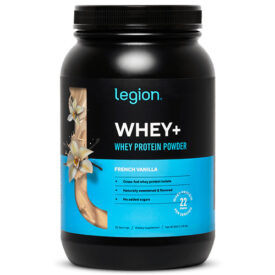
An all natural, non-GMO, fat-free whey that's cheaper than many competitors, Legion Whey Isolate Protein Powder is made from 100 percent grass-fed whey protein isolate from sustainable dairy farms in Ireland. It's also higher in calcium compared to other powders on the market.
Specs
- Price Per Serving: $2
- Protein Source: Grass-fed whey isolate protein
- Protein Per Serving: 23g
- Calories Per Serving: 100-130
- Third-Party Testing: Yes
- Available Flavors: Apple Pie, Banana Bread, Birthday Cake, Chocolate, Chocolate Hazelnut, Chocolate Peanut Butter, Cinnamon Cereal, Cocoa Cereal, Cookies And Cream, Fruity Cereal, Honey Cereal, Mocha Cappuccino, Salted Caramel, Strawberry Banana, Unflavored, Vanilla
Pros
- Organic supp made with dairy from grass-fed cows free from hormones, antibiotics
- Non-GMO, lactose-free, and sugar-free
- NSF certified and made in a GMP-certified facility
Cons
- Stevia’s bitter taste can be a deterrent for some
- Those with kidney issues will want to note the high amount of potassium
- On the pricier end of the average protein powder
According to Legion, the whey isolate in Whey+ comes from happy, grass-fed cows free from hormones and antibiotics. It’s also got a great macro balance of 23 grams of protein, between 1 and 2 grams of fat, and between 2 and 6 grams of carbs, depending on the flavor. “Whey+ is clinically dosed to support muscle building and workout recovery,” says BarBend expert reviewer Chelsea Rae Bourgeois, M.S., R.D.N., L.D.
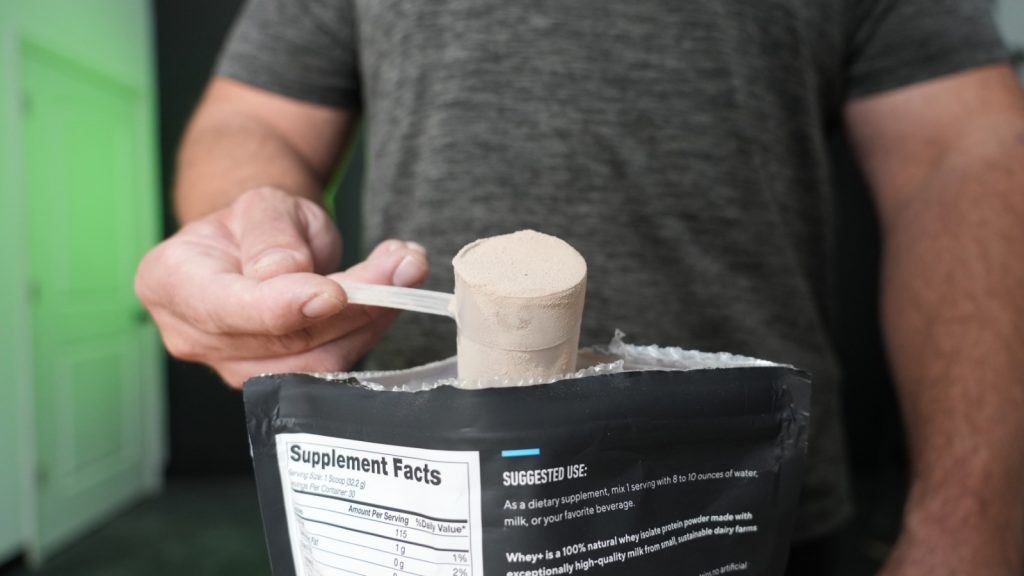
Whey+ is also one of the best organic protein powders we’ve tested, given that it’s free of fillers, artificial ingredients, and artificial sugars. Our tester reported a good taste and no problems with texture, scoring taste a 4.5 out of 5 and solubility a 5 out of 5. “I tried the Cinnamon Cereal and it tasted just like I was eating the real thing,” they said. “I wish it were a little bit richer, but it still tasted so accurate.”
Per our tester, your mileage may vary when it comes to this powder’s use of the all-natural sweetener stevia, which can be too bitter for some.
We do, though, like that it’s available in 16 different flavors. “I like the variety offered, and I love that you get more than 20 grams of protein per scoop without all the artificial junk,” adds Bourgeois. She also loves that it’s third-party tested to verify the purity of its ingredients. She scored its formulation a 4.75 out of 5.

Per BarBend’s own independent testing, though, we graded Whey+ at a C for purity. It scored within the top 10 percent of all sampled proteins for pesticides, phthalates, bisphenols, and overall label accuracy (that’s good!), it did rank in just the top 50 percent for the presence of heavy metals. This isn’t a major detriment to the effectiveness of the protein, but it’s worth noting if you’re consuming it daily. .
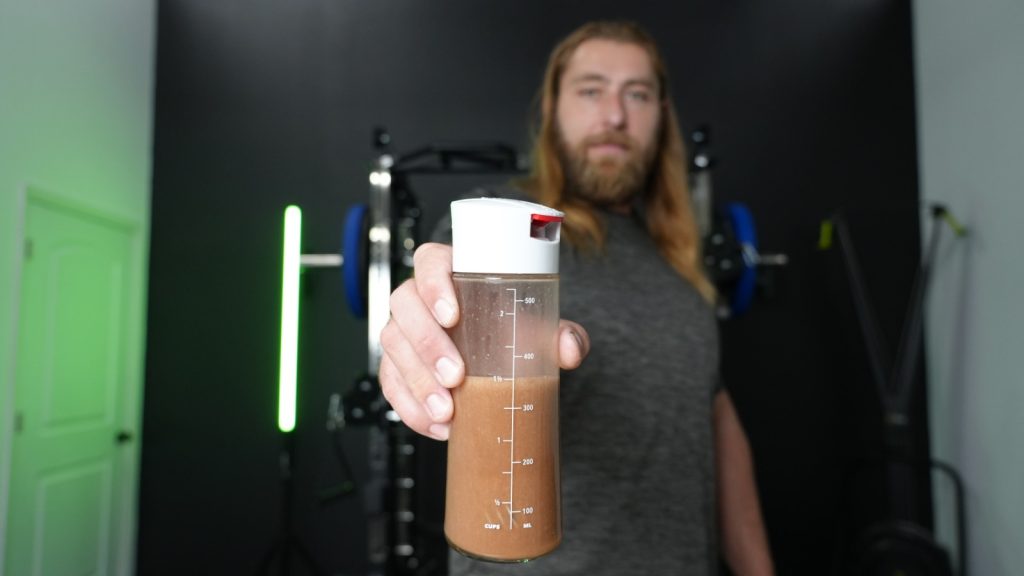
Bourgeois also notes the high potassium content in some flavors. “[This] may be a concern if you also take an electrolyte supplement,” she says. “Too much of a good thing isn’t always a good thing, especially if you have kidney issues.”
Read our full Legion Whey+ Review.
Best Vegan Low-Carb Protein Powder: Momentous Essential Plant-Based Protein
This vegan-friendly protein powder sources its protein from pea protein isolate and rice protein concentrate to deliver a complete amino acid profile that can support your gains without compromising your diet. It's also free of any gluten and artificial sweeteners and third-party tested by Informed Sport.
Specs
- Price Per Serving: $2.50
- Protein Source: Pea and rice
- Protein Per Serving: 20g
- Calories Per Serving: 140
- Third-Party Testing: Yes
- Available Flavors: Vanilla Chai, Chocolate
Pros
- Vegan-friendly, plant-based protein with complete amino acid profile
- Third-party tested by Informed Sport
- Gluten-free and devoid of artificial sweeteners, colors
Cons
- Costs $2.50 per serving for just 20 servings
- Has an “earthy” taste, per our tester
- The sandy texture may be off-putting for some
It can be tough to find good vegan protein sources, but Momentous Essential Plant-Based Protein is here to help. This product sources its protein from pea protein isolate and rice protein concentrate, resulting in a complete amino acid profile that’s been third-party tested by Informed Sport to verify its purity. Our tester scored its impressive formulation, which is free from gluten and artificial sweeteners, a 5 out of 5.
Vegans will be happy (and perhaps surprised) to find that our tester scored the flavor a 5 out of 5, noting that the Chocolate variety was true to taste. They did, however, report an “earthy taste” that may not be for everyone. “Personally, I dug that it was mild and not super sweet. Stuff that’s overly sweet with artificial sugars, stuff like that, I dislike the taste.”
They did the texture to be curious, though. “It was sorta sandy. Very fine, but definitely sand-like, which gave it a bit of thick texture. Still, I had no trouble getting it down.”
Solubility also scored a 5 out of 5, as the powder mixed well in water with nothing but a utensil. “I was sorta shocked at how well this mixed since I didn’t have a shaker cup handy,” they said. “Only took about two minutes to get it completely smooth with a fork.”
This is one of the best vegan protein powders we’ve tried, but we were still disappointed to see just two available flavors. As such, those who struggle with flavor fatigue may want to consider if this product is for them. Our eyes bugged out of our heads when we saw it costs $2.50 per serving for just 20 servings. Most protein powders cost between $1 and $2 per serving, so this one is not for budget shoppers. You can, however, save a bit of coin by buying in bulk.
Best Budget Low-Carb Protein Powder: Bulk Supplements Whey Protein Isolate 90% Powder
This product is clean and simple with 27 grams of whey protein isolate per serving and under one gram of carb and fat.
Specs
- Price Per Serving: $1.12
- Protein Source: Whey protein isolate
- Protein Per Serving: 26g
- Calories Per Serving: 110
- Third-Party Testing: N/A
- Available Flavors: Unflavored
Pros
- Just a little over $1 per serving
- Has 26 grams of protein per serving with no fat, carbs, or sugar
- No soy, gluten, or added sugars
Cons
- No flavor variety
- No third-party testing
Our pick for the best budget low-carb protein powder is Bulk Supplements Whey Protein Isolate 90% Powder. At just over $1 per serving — on the low range of the $1 to $2 per serving average of protein powders — this whey protein isolate product is chock full of protein and amino acids to support your post-workout routine. According to the label, each serving packs 26 grams of protein and contains no carbs, sugar, or fat. Our tester scored this product a 5 out of 5 for value and a 4 out of 5 for formulation.
We also like that it’s free of gluten, soy, and added sugars. Previous iterations of this powder did contain soy lecithin, but, per the label, it now utilizes sunflower lecithin.
[Related: Best Supplement Stacks]
Those desiring some funky flavors won’t find much variety here. Bulk Supplements only provides an Unflavored option. Unflavored powders, however, are more stackable than flavored powders, as you can mix them with smoothies, soups, cereal, and yogurt to best suit your routine. Our testers scored the taste a 4 out of 5 and solubility a 3.5 out of 5.
The biggest downside to this product is its lack of third-party testing, resulting in a 1 out of 5 for the category. That can be a dealbreaker for some athletes, as it doesn’t give them the peace of mind that a company is delivering on its promises.
Read the full Bulk Supplements Whey Protein Isolate Review.
Best Low-Carb Egg White Protein Powder: Naked Nutrition Naked Egg
An alternative to whey and casein protein powders, Naked Nutrition Naked Egg's fat-free formulation delivers 25 grams of protein, less than 2 grams of carbs, and 110 calories per serving. It's made from non-GMO chicken eggs that, according to the brand, are processed into a powder in under one day to retain a complete amino acid profile.
Specs
- Price Per Serving: $1.55
- Protein Source: Egg whites
- Protein Per Serving: 25g
- Calories Per Serving: 110
- Third-Party Testing: Yes
- Available Flavors: Unflavored
Pros
- Has 25 grams of protein sourced from non-GMO chicken eggs per serving
- Dairy-free supp still packs 5.8 grams of BCAAs per serving
- Gluten-free with no fillers, artificial flavors, or sweeteners
Cons
- Unsurprisingly, has a bit of an “eggy” taste, which some may find off-putting
- Not the most soluble powder we’ve tested
- No flavor options
An egg white protein powder like Naked Nutrition Naked Egg is a great alternative to whey protein powders if you’re lactose intolerant or allergic to dairy. Its protein-packed formula is fat-free with less than 2 grams of net carbs per serving. This protein powder is made from fresh, non-GMO chicken eggs that, according to Naked Nutrition, are processed into a powder in under one day to retain a complete amino acid profile.

This dairy-free formula delivers 25 grams of protein and 5.8 grams of BCAAs per serving. With just 110 calories, 2 grams of carbs, no sugar, and no fat, this supplement is ideal for lactose-intolerant athletes looking to build lean muscle mass.
Unsurprisingly, it has a bit of a “eggy” taste per our tester, a weightlifting coach and gym owner. You can, however, mask it a bit by adding it to fruit smoothies or coffee. Our tester preferred it in coffee, saying “I mixed it in the blender to get it frothy — it thickens up your coffee, but it does a lot to make the taste more palatable.” They scored it a 3 out of 5.

Solubility also scored a 3 out of 5. “It was fine in a smoothie, not grainy or anything,” they said. “I wouldn’t recommend mixing it with water, as I can’t imagine it would taste good, but it mixed fine there, too. Some small flecks.”
Naked Egg is unlikely to win over those with a taste for whey or casein protein, but it’s a solid option for those looking for a dairy-free protein powder.
Best Low-Carb Casein Protein Powder: NOW Sports Micellar Casein
This casein protein powder delivers 19 grams of protein, 90 calories, less than 1 gram of carbs, and less than 1 gram of fat per serving. It's manufactured in a GMP-certified facility and third-party tested by Informed Sport for banned substances.
Specs
- Price Per Serving: $1.32
- Protein Source: Micellar casein
- Protein Per Serving: 19g
- Calories Per Serving: 90
- Third-Party Testing: Yes
- Available Flavors: Unflavored
Pros
- Has 19 grams of casein protein with less than 1 gram of fat and carbs
- Just 90 calories per serving
- Casein tends to digest slower than other proteins, helping with satiety
Cons
- Contains less protein per serving than many competitors
- No flavor variety
There are several different types of protein, including casein, which also comes from milk but tends to be lower in lactose than whey. It also digests more slowly, so some find it helps them stay fuller for longer. (9) NOW Sports Micellar Casein contains 19 grams of protein per serving — most protein powders we’ve tested deliver between 20 and 28 — but its macro balance is nevertheless impressive, as it has less than 1 gram of fat and carbs per serving.
It’s also one of the least calorie-dense protein powders we’ve tried, clocking in at just 90 calories per serving. This, along with casein’s potential to help maintain satiety, makes it a good pick for those trying to drop a few pounds.
We also like that it’s manufactured in a GMP-certified facility and third-party tested by Informed Sport for banned substances. Its formulation and testing each scored a 5 out of 5 from our tester.
Our tester scored its taste a 4 out of 5, noting that the casein protein’s thicker nature can make it feel as if it’s coating your tongue when consuming it in a shake. “This can give it a bit of a ‘protein’ taste, if you know what I mean,” they said. Solubility, meanwhile, scored a 5 out of 5, as we had no issues during testing.
Those looking for variety may be disappointed by its lack of flavors, but its sole Unflavored option can be easily mixed in with smoothies, cereal, yogurt, and nut butters. Of course, this may be a downside for those looking for a more portable protein powder option that can be quickly made into a shake with your blender bottle.
Benefits of Low-Carb Protein Powders
Low-carb protein powders can support your protein intake needs without the extra sugar and calories. These low-carb protein powders can also support muscle strength and performance with essential amino acids. They can also be a great addition to low-carb lifestyles as either a meal replacement or as a supplement to meals and snacks.
Weight Management
If you’re trying to drop a few pounds, studies have shown that a low-carb diet can help promote fat loss. (10) Research has also shown that a diet low in carbohydrates may help improve the health of those struggling with obesity or diabetes. (11)

If you’re eating less meat due to a diet, adding a protein powder that’s light on calories and carbs can help ensure that you’re keeping up with your protein needs without impacting your other macros.
If you’re still waiting for one of the best meal replacements to hit your doorstep, you can also mix a low-carb protein powder with foods like whole-fat yogurt, nut butters, and fruits to help you stay satiated without any unneeded sugar. In turn, low-carb protein shakes can provide an suitable base for a healthy meal replacement shake.
Metabolism Support
Studies have shown that a low-carb diet, when paired with exercise, can help support fat and carbohydrate metabolism and regulate the metabolic factors of cardiovascular diseases. (12)
Post-Workout Recovery
Research has shown that a high-protein diet can support increased lean muscle mass and decreased fat mass. (13) Mounting evidence suggests that a high-protein diet may have safe, positive effects on your body weight and body composition (increased lean muscle mass and decreased fat mass). Better yet, it’s also been shown to help improve muscle recovery after an intense day in the gym. (14)
How Much Do Low-Carb Protein Powders Cost?
The average protein powder costs roughly between $1 and $2 per serving, though vegan and plant-based options can sometimes cost upwards of $2.50 per serving. We’ve got picks on both ends of that average, as well as a few that surpass it. Check out the chart below for a side-by-side look at the cost of these low-carb protein supplements.
| Best Low-Carb Protein Powder Overall | Transparent Labs Whey Protein Isolate | $1.99 per serving |
| Best-Tasting Low-Carb Protein Powder | XWERKS Grow | $1.96 per serving |
| Best Low-Carb Whey Isolate Protein Powder | Jacked Factory Authentic ISO | Starting at $1.16 per serving |
| Best Low-Carb Protein Powder for Athletes | Onnit Grass-Fed Whey Protein | $2 per serving |
| Best Low-Carb Pea Protein Powder | Ritual Essential Daily Shake 18+ | $2.67 per serving |
| Best Grass-Fed Low-Carb Protein Powder | Legion Whey+ | $2 per serving |
| Best Vegan Low-Carb Protein Powder | Momentous Essential Plant-Based Protein | $2.50 per serving |
| Best Budget Low-Carb Protein Powder: | Bulk Supplements Whey Protein Isolate 90% Powder | $1.12 per serving |
| Best Low-Carb Egg White Protein Powder | Naked Nutrition Naked Egg | $1.55 per serving |
| Best Low-Carb Casein Protein Powder | NOW Sports Micellar Casein | $1.32 per serving |
How to Choose the Best Low-Carb Protein Powder
Not every low-carb protein powder will be right for everyone. Different health backgrounds and lifestyles will require different nutrient requirements.

But the factors below can be helpful to think about for anyone trying to choose the right low-carb protein powder.
Protein Source
Depending on your health status, you may not be able to consume all types of proteins. Protein powders may contain whey protein, egg protein, pea protein, soy protein, or casein, for example. Therefore, be sure to read the package label line by line. This way you can make sure the protein powder you choose best fits your healthy eating plan.
Protein Content
When choosing a protein powder, you also want to check the protein content of the product. Most protein powders contain between 20 and 25 grams of protein per serving, give or take a few grams. If you have an active lifestyle, you will want to choose a protein powder that contains a higher amount of protein to meet your daily needs.
Added Ingredients
Some low-carb protein powders may contain compounds that you wouldn’t know were present if you didn’t check the label. Such compounds may include MCT oil compounds, sunflower lecithin, probiotics, flavors, dyes, or sweeteners like stevia, sucralose, or monk fruit. Some of these ingredients can trigger allergies or cause GI distress for some athletes, so it’s best to scan the label before buying to ensure a pleasant experience.
Flavor
If you do not like the flavor of the protein powder you choose, you likely won’t be consuming it very often (if at all). Before experimenting with new flavors, opt for old favorites so you don’t end up with a tub that sets off your gag reflex.

It can also be helpful to read reviews — like ours — and scan the customer remarks on a company’s website, as they’ll often comment on the available flavors. If possible, check for samples that the protein powder company may provide, so you can try before you buy.
Price
Before choosing any supplement for your daily routine, you should consider price. We broke down the cost of the powders on our list by their price per serving, as the amount of servings in a given package can have a big impact on its overall cost.
Budget-friendly protein powders tend to cost around $1 per serving, while pricier options can cost upwards of $2 per serving.
Final Word
For anyone adhering to a keto diet, struggling with diabetes, or looking to build lean muscle mass, low-carb protein powders deliver a potent dose of protein to support your health and fitness goals while not breaking your calorie budget for the day. The low sugar content of these products makes them a solid addition to post-workout snacks and meals.
When choosing a low-carb protein powder, you should consider how it’s going to fit your budget, align with your health goals, and clash with any dietary restrictions. No one protein powder is not going to work for everyone, so take your time and find one that not only tastes good, but makes you feel your very best inside and out.
Best Low-Carb Protein Powders FAQs
What is the best low-carb protein powder?
Protein powders suited for low-carb diets will have either very little or no added sugars and carbohydrates. Our favorite low-carb protein powder is Transparent Labs Whey Protein Isolate, as it balances a whopping 28 grams of protein with 0 to 3 grams of carbs and just 120 to 150 calories per serving, depending on the flavor (and there are a lot of flavors). It’s been third-party tested by Informed Choice and our own testing returned positive results for its purity.
What is the best low-carb vegan protein powder?
Our pick for the best low-carb vegan protein powder is Momentous Essential Plant-Based Protein, which packs 20 grams of protein per serving that’s been sourced from pea protein isolate and rice protein concentrate, resulting in a complete amino acid profile that’s been third-party tested by Informed Sport to verify its purity.
How much do low-carb protein powders cost?
Low-carb protein powders tend to cost between $1 and $2 per serving for the most part, though plant-based and vegan options can sometimes creep up to more than $2.50 per serving. You can often find subscribe and save deals on protein powders by buying in bulk or setting up recurring purchases. Brands may also offer first-time buyer discounts.
References
1. Wu G. (2016). Dietary protein intake and human health. Food & function, 7(3), 1251–1265.
2. Nutrition and Athletic Performance. Medicine & Science in Sports & Exercise 41(3):p 709-731, March 2009. | DOI: 10.1249/MSS.0b013e31890eb86
3. Zhou, H. H., Liao, Y., Zhou, X., Peng, Z., Xu, S., Shi, S., Liu, L., Hao, L., & Yang, W. (2023). Effects of Timing and Types of Protein Supplementation on Improving Muscle Mass, Strength, and Physical Performance in Adults Undergoing Resistance Training: A Network Meta-Analysis. International journal of sport nutrition and exercise metabolism. 34(1), 54–64.
4. Ullevig, S. L., Zuniga, K., Austin Lobitz, C., Santoyo, A., & Yin, Z. (2022). Egg protein supplementation improved upper body muscle strength and protein intake in community-dwelling older adult females who attended congregate meal sites or adult learning centers: A pilot randomized controlled trial. Nutrition and health, 28(4), 611–620.
5. Wang, J., Kadyan, S., Ukhanov, V., Cheng, J., Nagpal, R., and Cui, L. (2022) “Recent advances in the health benefits of pea protein (Pisum sativum): bioactive peptides and the interaction with the gut microbiome.” Current Opinion in Food Science, Volume 48, December 2022. https://www.sciencedirect.com/science/article/abs/pii/S2214799322001461
6. Shanthakumar, P., Klepacka, J., Bains, A., Chawla, P., Dhull, S. B., & Najda, A. (2022). The Current Situation of Pea Protein and Its Application in the Food Industry. Molecules (Basel, Switzerland), 27(16), 5354.
7. Hulmi, J.J., Lockwood, C.M., Stout, J.R. (2010) Effect of protein/essential amino acids and resistance training on skeletal muscle hypertrophy: A case for whey protein. Nutr Metab (Lond), 7:51.
8. Gao, H., Li, X., Chen, X., Hai, D., Wei, C., Zhang, L., & Li, P. (2022). The Functional Roles of Lactobacillus acidophilus in Different Physiological and Pathological Processes. Journal of microbiology and biotechnology, 32(10), 1226–1233.
9. Bendtsen, L.Q., Lorenzen, J.K., Bendsen, N.T., Rasmussen, C., Astrup, A. (2013). Effect of dairy proteins on appetite, energy expenditure, body weight, and composition: a review of the evidence from controlled clinical trials. Adv Nutr. 4(4):418-38.
10. Oh, R, Gilani, B, Uppaluri, K.R. Low-Carbohydrate Diet. [Updated 2023 Aug 17]. In: StatPearls [Internet]. Treasure Island (FL): StatPearls Publishing. https://www.ncbi.nlm.nih.gov/books/NBK537084/
11. Pavlidou, E., Papadopoulou, S. K., Fasoulas, A., Mantzorou, M., & Giaginis, C. (2023). Clinical Evidence of Low-Carbohydrate Diets against Obesity and Diabetes Mellitus. Metabolites, 13(2), 240. https://doi.org/10.3390/metabo13020240
12. Macedo, R.C.O., Santos, H.O., Tinsley, G.M., Reischak-Oliveira, A. (2020). Low-carbohydrate diets: Effects on metabolism and exercise – A comprehensive literature review. Clin Nutr ESPEN. 40:17-26.
13. Antonio, J., Candow, D.G., Forbes, S.C., Ormsbee, M.J., Saracino, P.G., Roberts, J. (2020). Effects of Dietary Protein on Body Composition in Exercising Individuals. Nutrients. Jun 25;12(6):1890.
14. Davies, R.W., Carson, B.P., Jakeman, P.M. (2018). The Effect of Whey Protein Supplementation on the Temporal Recovery of Muscle Function Following Resistance Training: A Systematic Review and Meta-Analysis. Nutrients. Feb 16;10(2):221.